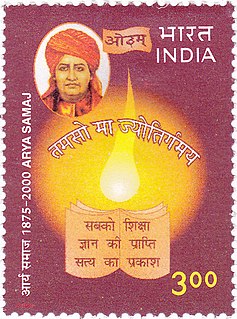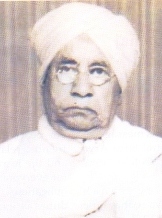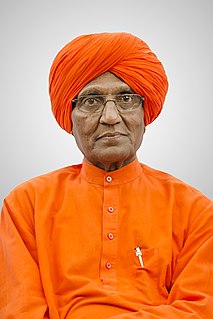
Dayananda Saraswatipronunciation (help·info) was an Indian philosopher, social leader and founder of the Arya Samaj, a reform movement of the Vedic dharma. He was the first to give the call for Swaraj as "India for Indians" in 1876, a call later taken up by Lokmanya Tilak. Denouncing the idolatry and ritualistic worship prevalent in India at the time, he worked towards reviving Vedic ideologies. Subsequently, the philosopher and President of India, S. Radhakrishnan called him one of the "makers of Modern India", as did Sri Aurobindo.

Arya Samaj is a monotheistic Indian Hindu reform movement that promotes values and practices based on the belief in the infallible authority of the Vedas. The samaj was founded by the sannyasi (ascetic) Dayanand Saraswati on 10 April 1875. Members of the Arya Samaj believe in one God and reject the worship of idols.
Several contemporary groups, collectively termed Hindu reform movements or Hindu revivalism, strive to introduce regeneration and reform to Hinduism, both in a religious or spiritual and in a societal sense. The movements started appearing during the Bengali Renaissance.
Shuddhi is Sanskrit for purification. It is a term used for reconverting those that are deemed to have converted away from Hinduism back to Hinduism.

Shyamji Krishna Varma was an Indian revolutionary fighter, an Indian patriot, lawyer and journalist who founded the Indian Home Rule Society, India House and The Indian Sociologist in London. A graduate of Balliol College, Krishna Varma was a noted scholar in Sanskrit and other Indian languages. He pursued a brief legal career in India and served as the Divan of a number of Indian princely states in India. He had, however, differences with Crown authority, was dismissed following a supposed conspiracy of local British officials at Junagadh and chose to return to England. An admirer of Dayanand Saraswati's approach of cultural nationalism, and of Herbert Spencer, Krishna Varma believed in Spencer's dictum: "Resistance to aggression is not simply justified, but imperative".

Lala Lajpat Rai was an Indian freedom fighter. He played a pivotal role in the Indian Independence movement. He was popularly known as Punjab Kesari. He was one of the three Lal Bal Pal triumvirate. He was also associated with activities of Punjab National Bank and Lakshmi Insurance Company in their early stages in 1894.
The name Swami Dayananda may refer to:

The Arya Samaj was the first religious, cultural and educational Fiji Indian organisation established in Fiji. From its inception, in 1904, it attracted the young, educated and progressive Hindus into its fold. During the first three decades of the twentieth century, it was the sole voice of the Indian community in Fiji and as Fiji Indians won political rights, it was not surprising that first Indian members of the Legislative Council were all Arya Samajis. The influence of Arya Samaj over the Indians in Fiji gradually waned as other organisations representing Indians were established but it remained the dominant force in politics until 1959. The modern day Arya Samaj in Fiji still speaks out on issues affecting its members and its activities are visible through the numerous educational institutions that it manages.
The Theosophical Society of Aryavarta, also sometimes called Theosophical Society of India, and abbreviated as Theosophical Society was a Theosophical Society from May 22, 1878 until March 1882.
The D.A.V. College Managing Committee, familiarly known as DAVCMC, is a non-governmental educational organisation in India and overseas with over 900 schools. 75 colleges and a university. It is based on the ideals of the religious and social reformer, Swami Dayanand Saraswati. The Dayanand Anglo-Vedic education system also comprises colleges offering graduate and post-graduate degrees in various areas of study all over India.

Gurukula Kangri Vidyapeeth or Gurukul Kangri Vidyapeeth is a university in the city of Haridwar in the Indian state of Uttarakhand. It is on the bank of the Ganges about 6 km from Hardwar and about 200 km from Delhi.

Thakur Kundan Pal Singh Kush (1881–1967) was an Arya Samaj missionary and teacher who arrived in Fiji, from Muzaffarnagar, Uttar Pradesh, India in 1928. He first taught at the Dharamshala School in Nausori where he later became the founding Head Teacher of Vunimono Arya School in 1929. He taught in a number of Arya Samaj schools which included Gurukul Primary School near Lautoka in 1939, Arya Samaj Girls' School in Saweni, Lautoka, from 1940 to 1945, Swami Shraddanand Memorial School in Suva, Vunikavikaloa Arya School in Ra, and Veisari Primary School near Suva.

Arya Samaj is a Hindu reform movement in South Africa. Like other parts of the world where people of Indian origin are settled, the teachings of Swami Dayananda Saraswati, founder of the Arya Samaj, made their way to South Africa during the beginning of the twentieth century. The Arya Samaj encouraged Indian South Africans to take pride in their heritage and culture and promoted education and social reform.

Agnivesh, is an Indian politician and a former Member of Legislative Assembly from the Indian state of Haryana, joined Arya Samaj, and a social activist. He is best known for his work against bonded labour through the Bonded Labour Liberation Front, which he founded in 1981. Agnivesh became president (2004–2014) of the World Council of Arya Samaj, which is the highest international body of the Arya Samaj movement originally established by Dayanand Saraswati in 1875, and served as the chairperson of the United Nations Voluntary Trust Fund on Contemporary Forms of Slavery from 1994 to 2004
Hindu Maha Sabha was an organisation representing various Hindu organisations and was formed in Fiji in 1926, following the formation of All-India Hindu Maha Sabha in India. The formation of the organisation both in India and Fiji occurred after the assassination of Swami Shraddhanand, a Hindu activist in India. The formation of the Sabha in Fiji coincided with the formation of a national Muslim organisation, the Fiji Muslim League.

Arya Samaj is a Hindu reform movement in Mauritius. Established in 1911, the Arya Paropkarini Sabha was officially registered in 1913. Since its creation Arya Samaj has had a great influence on the religious, social, educational and political lives of the people of Indian origin on the island. It has endeavoured to uphold the principles and ideals set forth by Maharishi Dayanand and his reformist movement. Some of the more notable ideals are women parity and free access to education. It has provided Hindus with a choice of progressive Hinduism, has promoted education with particular emphasis on Hindi and established orphanages, primary schools, colleges and tertiary institution.

Swami Shraddhanand, also known as Mahatma Munshi Ram Vij, was an Indian Independence activist and an Arya Samaj sannyasi who propagated the teachings of Dayananda Saraswati. This included the establishment of educational institutions, like the Gurukul Kangri University, and played a key role on the Sangathan and the Shuddhi (re-conversion), a Hindu reform movement in the 1920s.
Pundit Ganga Prasad Upadhyaya (1871-1968) was an Arya Samaji writer. He served as professor of Meerut College at Allahabad University and as chief judge at Tehri, Garhwal District, from which post he retired to serve the Arya Samaj full-time. . He was the father of Swami Satya Prakash Saraswati, another notable Arya Samaji author.
Mangilal Arya was an Indian freedom fighter and social reformer.











